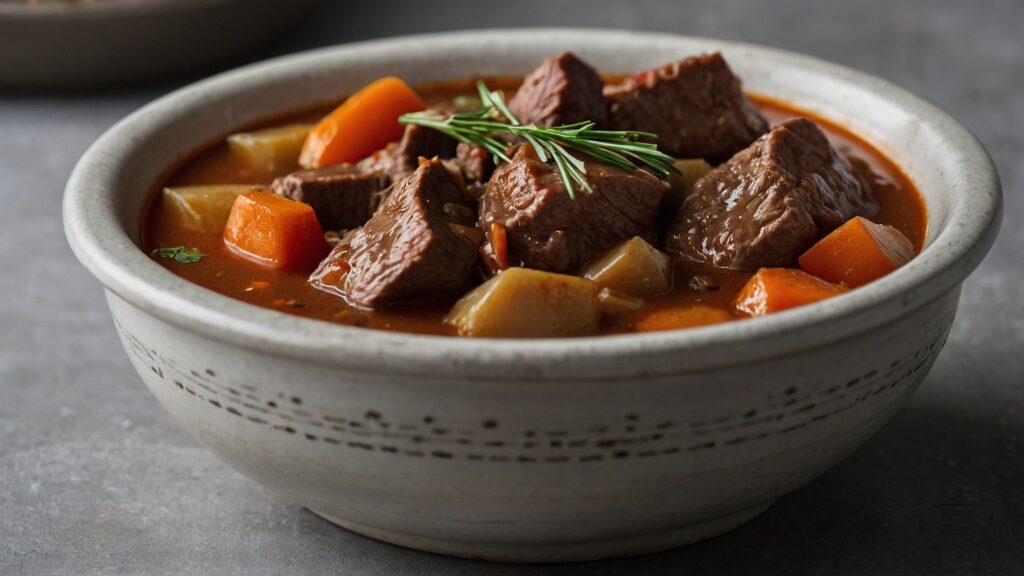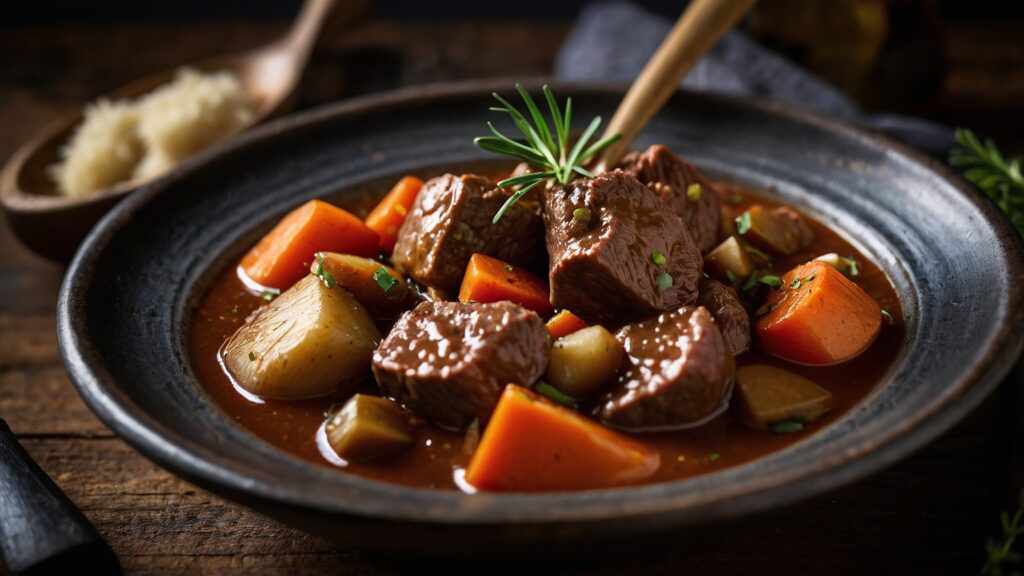Beef stew is a hearty comfort food that’s popular with many humans. This stew is made with a mix of meat and vegetables, usually beef, potatoes, carrots, onions, celery, and a rich, savory gravy or sauce. While we humans may enjoy beef stew on a cold day, is it safe and healthy for our cats to eat?
Beef stew is a hearty, flavorful dish that many pet owners love to eat especially when the weather turns cold. Naturally, the tantalizing smells coming from the slow cooker may make your cat curious if they can indulge in people food and try some too. But is beef stew safe for cats to eat or something better reserved for their humans?
In this article, we’ll take a detailed look at the potential benefits and risks of cats eating beef stew. We’ll cover the nutritional value along with ingredients to watch out for. Let’s start with an overview of the key considerations.
Key Factors on Feeding Cats Beef Stew
There are a few important factors to keep in mind when assessing whether beef stew is appropriate to feed cats:
-
Ingredients like onions and garlic can be toxic for cats and may rule out beef stew entirely.
-
The high-fat content compared to cat food could cause stomach upset, diarrhea or pancreatitis.
-
Added seasonings and salt content should be minimal for feline health
-
The vegetables and beef can add beneficial vitamins and minerals if prepared safely
-
Beef stew should always be just an occasional treat, not a dietary staple.
Potential Benefits of Beef Stew for Cats
When prepared properly with cats in mind, beef stew can offer some nutritional benefits as an occasional treat. Here are some of the positives it provides:
-
Protein from beef – Meat is an important part of a cat’s diet, and stew beef provides protein. Look for lean cuts without much fat.
-
Vitamins and minerals – The carrots, potatoes and other veggies in stew can provide beneficial nutrients like vitamin A, potassium and iron.
-
Fluids – The liquid broth can help provide extra hydration for cats, especially helpful for senior cats or those prone to urinary issues.
-
Weight maintenance – The protein and vegetables can help satisfied hungry cats who need to lose weight when given proper portion sizes.
So in short, beef, veggies and broth can all be healthy components when prepared safely for cats to eat. The key is moderation and limiting any problematic ingredients.
Potential Risks of Feeding Cats Beef Stew
While it can offer benefits, beef stew also contains some inherent risks and harmful ingredients for cats. Here are some of the biggest dangers and downsides to look out for:
-
Onions and garlic – These ingredients are toxic for cats and can cause a rare condition called hemolytic anemia. Never feed cats stew containing onions or garlic.
-
Fat content – The higher fat content compared to cat food could cause vomiting, diarrhea, pancreatitis and other issues.
-
Seasonings – Beef stew seasonings may contain toxic or upsetting ingredients for cats like black pepper, salt, chives and paprika.
-
Nutritional imbalance – Cat foods are balanced with cats’ needs in mind. Relying on beef stew could create vitamin deficiencies.
-
Choking hazards – Small pieces of beef, veggies or noodles could pose a choking risk for cats.
-
Bones – Some bone-in beef stew recipes could have small bones that also present a choking hazard.
Clearly the risks and dangerous ingredients outweigh any minimal benefits. Extensive precautions are needed to make beef stew safe for cats.
Tips for Safely Feeding Cats Beef Stew
If you want to share a small amount of your beef stew with cats after assessing the risks, here are some tips to reduce chances of harm:
-
Review all ingredients and avoid any onions, garlic, chives, salt or other seasonings.
-
Choose a bone-free stew with very lean beef or remove the beef and shred it before feeding.
-
Skim any visible fat off the top of the stew and broth before serving.
-
Pick out soft cooked veggies and cut into tiny pieces to reduce choking hazard.
-
Allow stew to cool to room temperature before feeding to avoid burns.
-
Limit portion size to 1-2 small spoonfuls max mixed into their regular cat food.
-
Monitor your cat closely afterward for any vomiting, diarrhea or signs of distress.
-
Discontinue feeding if any issues arise and consult your vet.
With the proper precautions, an occasional spoonful of beef stew without onions/garlic may be safe. But it should never become a regular part of your cat’s diet.
Healthier Alternatives to Feed Cats
Rather than taking risks with beef stew, there are many healthier ways to mix up your cat’s diet and provide special treats. Here are some safer ideas:
-
Cook plain lean beef, chicken or turkey without salt or seasoning and shred for cats.
-
Mash cooked sweet potatoes, carrots or green beans into their wet food.
-
Sprinkle some cat-safe herbs like parsley, cilantro or catnip on food.
-
Make DIY cat-safe broths using cat-friendly veggies and unsalted chicken or beef stock.
-
Purchase or make pre-made frozen raw cat food with meat and supplements tailored to their needs.
-
Try high-quality wet cat foods in new meat flavors like rabbit, duck or venison for variety.
With a bit of creativity, you can come up with many ways to add variety and enrichment to your cat’s diet without the risks of beef stew. Focus on cat-safe ingredients tailored to their nutritional needs.
The Verdict on Cats and Beef Stew
If you do choose to share a tiny amount of beef stew, stick to 1-2 spoonfuls max at a time. Avoid onions/garlic, skim fat, eliminate bones or salt, and pick soft vegetables. Watch closely for any reaction. And remember – a beef stew treat here and there should never replace an overall balanced cat diet tailored to their needs. With some smart adjustments and precautions, though, small tastes may be safe on occasion for cats to savor this beloved human food.

Ingredients in Beef Stew That Are Unsafe for Cats

Let’s take a closer look at some of the concerning ingredients commonly found in beef stew recipes:
Cats can’t eat beef stew because it has onions and sometimes garlic in it to make it taste better. Onions and garlic contain compounds called thiosulfates that are toxic to cats when ingested.
Cats lack the liver enzymes needed to properly digest thiosulfates. So, the thiosulfates can damage red blood cells through oxidative stress, creating Heinz bodies inside the cells that are dense and dangerous. This process severely impairs the ability of the red blood cells to function and transport oxygen.
Onion and garlic toxicity can cause the following symptoms in cats:
- Lethargy, weakness
- Pale gums
- Rapid breathing
- Elevated heart rate
- Brown or orange urine
In severe cases, it can lead to hemolytic anemia which requires emergency veterinary treatment. Onions are considered more toxic than garlic to cats, but both should be avoided. Even small amounts found in beef stew can be harmful, so it’s not worth the risk.
The rich gravy or sauce in beef stew poses a couple hazards for cats:
Beef stew gravy has a lot of fat because the meat juices and oils used to brown the vegetables are a lot of fat. The high saturated fat content can lead to pancreatitis which is a serious inflammatory condition of the pancreas. Cats have trouble digesting and metabolizing fat.
Seasoning – Stews are flavored with onions, garlic, salt, herbs, sometimes wine or Worcestershire sauce. These all contain additives and spices that can upset a cat’s stomach. Cats should not consume added salt or seasoned human foods.
Beef can make a healthy treat for cats on occasion. However, the beef found in beef stew may be:
- Fattier cuts: Stews that are cooked slowly usually use cuts of beef that have more marbling. This extra fat is difficult for cats to digest.
- Overcooked—Beef that has been cooked for too long is drier and stringier. Cats prefer and digest raw or lightly cooked meat best.
A few bites of lean, cooked beef won’t harm cats. Beef stew, on the other hand, often has a lot of fat in it, which can make you sick if you eat it for a long time or in large amounts.
Common veggies in beef stew like carrots and potatoes are very starchy and high in carbohydrates. Cats’ bodies are not designed to digest plant matter like vegetables well. The complex carbs can be hard for their digestive system to break down.
Some cats may nibble small amounts of non-toxic vegetables out of curiosity. But eating a lot of starchy vegetables, like those in beef stew, can make your stomach upset and make you throw up, have diarrhea, or have gas.
Safe Alternatives to Beef Stew for Cats

What should you feed your cat instead of beef stew to make sure it stays healthy? Here are some ideas:
- Wet/canned cat food – Look for grain-free, high protein varieties. Prioritize meat as the first ingredient.
- For dry cat food, choose a brand with a good reputation that provides complete and balanced nutrition.
- Lean cooked meat: Boiling chicken or beef that hasn’t been seasoned gives you protein without any fat or spices.
- Cat treats: Low-calorie treats are safer than table food when given in small amounts.
- Cat milk or broth: less fat than beef stew drippings and full of nutrients
- Cat supplements (as needed): Talk to your vet about supplements that can help your cat get all the nutrients it needs.
For the best health, give your cat a mix of high-protein wet and dry food that is made for their age and stage of life. Avoid unhealthy table scraps and foods with toxic ingredients like onion or garlic. Talk to your veterinarian if you have any concerns about your cat’s nutritional needs.
How to Make Homemade Cooked Cat Food – with Know Better for Cats & Beef
FAQ
Is it safe for cats to eat beef?
Can cats eat slow cooked beef?
Can I cook beef for my cat?
Can I feed soup to my cat?
